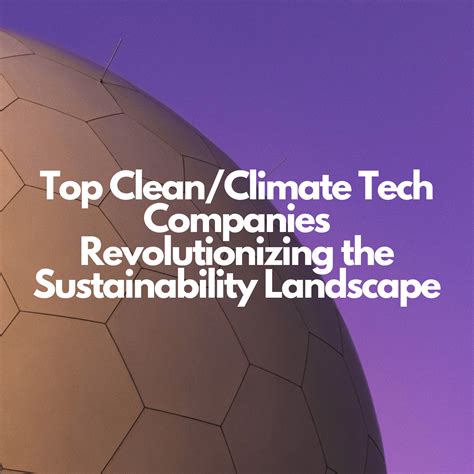The world is at a critical juncture in its quest for sustainability. As the impact of climate change, pollution, and environmental degradation becomes increasingly evident, the need for innovative solutions to mitigate these effects has never been more pressing. Clean tech services have emerged as a beacon of hope in this endeavor, offering a wide range of sustainable solutions that can help reduce our carbon footprint, promote eco-friendly practices, and ensure a healthier planet for future generations.
The Importance of Clean Tech Services
Clean tech services encompass a broad spectrum of technologies and innovations aimed at reducing environmental impact, improving energy efficiency, and promoting sustainable development. From renewable energy sources like solar and wind power to green building technologies, sustainable agriculture practices, and eco-friendly transportation systems, clean tech services have the potential to transform the way we live, work, and interact with the environment.
The benefits of clean tech services are multifaceted. Not only do they help reduce greenhouse gas emissions and mitigate the effects of climate change, but they also offer significant economic benefits, including job creation, cost savings, and increased competitiveness. Moreover, clean tech services can improve public health, enhance energy security, and promote sustainable economic growth.
Key Components of Clean Tech Services
Clean tech services comprise several key components that work together to promote sustainability and reduce environmental impact. Some of the most significant components include:
Renewable Energy Sources
Renewable energy sources like solar, wind, and hydroelectric power have emerged as viable alternatives to fossil fuels, offering a cleaner, more sustainable way to generate energy. Clean tech services have made it possible to harness these energy sources efficiently, reducing costs and increasing accessibility.

Energy Efficiency Solutions
Energy efficiency solutions are designed to reduce energy consumption, lower costs, and minimize environmental impact. Clean tech services offer a range of energy-efficient solutions, including LED lighting, smart building technologies, and energy management systems.

Sustainable Agriculture Practices
Sustainable agriculture practices are critical to promoting food security, reducing environmental impact, and conserving natural resources. Clean tech services offer innovative solutions like precision agriculture, vertical farming, and regenerative agriculture to promote sustainable agriculture practices.

Benefits of Clean Tech Services
The benefits of clean tech services are numerous and far-reaching. Some of the most significant benefits include:
Environmental Benefits
Clean tech services offer significant environmental benefits, including reduced greenhouse gas emissions, improved air and water quality, and conservation of natural resources.
Economic Benefits
Clean tech services offer numerous economic benefits, including job creation, cost savings, and increased competitiveness.
Health Benefits
Clean tech services can improve public health by reducing air and water pollution, promoting sustainable agriculture practices, and increasing access to clean energy.

Implementing Clean Tech Services
Implementing clean tech services requires a multifaceted approach that involves individuals, organizations, and governments. Some of the key steps to implementing clean tech services include:
Conducting Energy Audits
Conducting energy audits is a critical step in identifying areas of energy inefficiency and implementing energy-efficient solutions.
Investing in Renewable Energy Sources
Investing in renewable energy sources like solar and wind power can help reduce dependence on fossil fuels and promote sustainable energy production.
Implementing Sustainable Agriculture Practices
Implementing sustainable agriculture practices like precision agriculture and regenerative agriculture can help promote food security, reduce environmental impact, and conserve natural resources.

Challenges and Opportunities in Clean Tech Services
Despite the numerous benefits of clean tech services, there are several challenges and opportunities that need to be addressed. Some of the key challenges and opportunities include:
Financing Clean Tech Services
Financing clean tech services is a significant challenge, requiring innovative financing models and investment strategies.
Developing Clean Tech Infrastructure
Developing clean tech infrastructure is critical to promoting the adoption of clean tech services, requiring significant investment in renewable energy sources, energy-efficient solutions, and sustainable agriculture practices.
Creating Clean Tech Jobs
Creating clean tech jobs is a significant opportunity, requiring training and education programs to equip workers with the skills needed to succeed in the clean tech industry.

Conclusion
Clean tech services offer a wide range of sustainable solutions that can help reduce our carbon footprint, promote eco-friendly practices, and ensure a healthier planet for future generations. While there are several challenges and opportunities in clean tech services, the benefits of these services far outweigh the costs. As individuals, organizations, and governments, we must work together to promote the adoption of clean tech services, invest in renewable energy sources, and develop clean tech infrastructure. Only then can we create a more sustainable future for all.






What are clean tech services?
+Clean tech services refer to a range of technologies and innovations aimed at reducing environmental impact, improving energy efficiency, and promoting sustainable development.
What are the benefits of clean tech services?
+The benefits of clean tech services include reduced greenhouse gas emissions, improved air and water quality, conservation of natural resources, job creation, cost savings, and increased competitiveness.
How can I implement clean tech services in my organization?
+To implement clean tech services in your organization, conduct an energy audit, invest in renewable energy sources, implement energy-efficient solutions, and promote sustainable agriculture practices.
